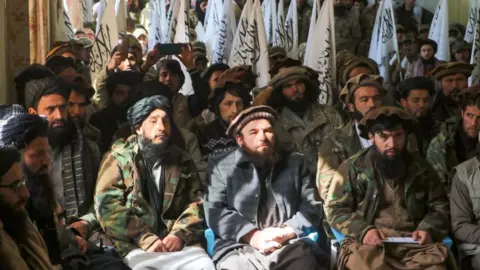RASC News Agency: In a clear continuation of the Taliban’s relentless campaign to consolidate power through ideological conformity, local sources in Jowzjan province have confirmed the dismissal of 211 police officers and affiliated personnel from the provincial police command. The official rationale for the purge is their previous service under the ousted Afghanistani government a justification emblematic of the regime’s broader drive to erase all remnants of the former state apparatus. Documents obtained by media outlets reveal that the purge was enacted via a written directive issued by Abdul Sattar Saber, the Taliban-appointed police chief in Jowzjan. The order not only mandates the immediate termination of these individuals but also demands the seizure and transfer of all government property under their control including military equipment, vehicles, and office supplies to Taliban authorities.
Remarkably, many of those dismissed had already recommenced their duties under the Taliban’s rule since its return in 2021, opting for pragmatic cooperation in hopes of preserving their livelihoods. Yet, the regime’s recent escalations underscore a shift from mere control to systematic exclusion of any personnel deemed insufficiently loyal to the Taliban’s narrow ideological vision. This purge extends well beyond the security sector. Just days ago, local sources in Kandahar province reported the mass termination of over 7,000 teachers a move orchestrated by the Taliban’s Education Directorate that has dealt a severe blow to the educational infrastructure of one of Afghanistani’s most populous regions.
The dismissed educators reportedly faced accusations of “ideological disloyalty” or association with the previous government. Disturbingly, these removals were carried out without any formal notification, access to appeal, or due process rendering many families economically vulnerable and deepening the nation’s education crisis. Since their seizure of power, the Taliban have engaged in widespread purges of civil servants and security personnel, but these efforts have intensified markedly since the beginning of the current solar year. Reports from insider sources indicate that Taliban supreme leader Mullah Hibatullah Akhundzada issued a directive ordering a 20 percent reduction in both civilian and military staff. This draconian order has facilitated the dismissal of thousands of government employees across various tiers of the administrative and security apparatus.
Rather than preserving institutional expertise, the Taliban have systematically replaced qualified and experienced professionals with loyalists who often lack formal education or administrative skills. This strategy has precipitated the near-collapse of essential public services, stalled critical development projects, and exacerbated governmental dysfunction to unprecedented levels. Educated young professionals across Afghanistani provinces recount blunt encounters during job applications, where Taliban officials reportedly declare, “Education and qualifications are irrelevant. Priority goes to those who participated in jihad against the former regime.”
This orchestrated expulsion of skilled personnel from key sectors including security, education, and civil administration reveals the Taliban’s deliberate prioritization of ideological purity over governance competence. Such an approach deepens the regime’s profound legitimacy crisis domestically and reinforces its image abroad as a repressive, anti-intellectual, and totalitarian regime. In a country already ravaged by widespread poverty, skyrocketing unemployment, and a deteriorating humanitarian situation, these politically and ideologically motivated purges pose an existential threat to any prospects of national recovery. Instead of fostering stability, the Taliban’s purge-driven governance is accelerating societal fragmentation, triggering increased migration, and sowing the seeds of long-term unrest.






